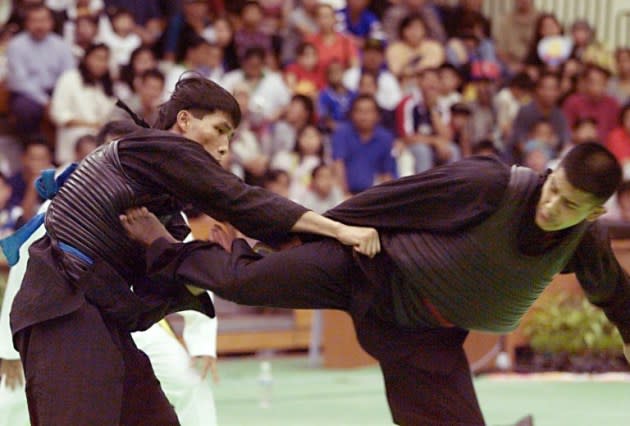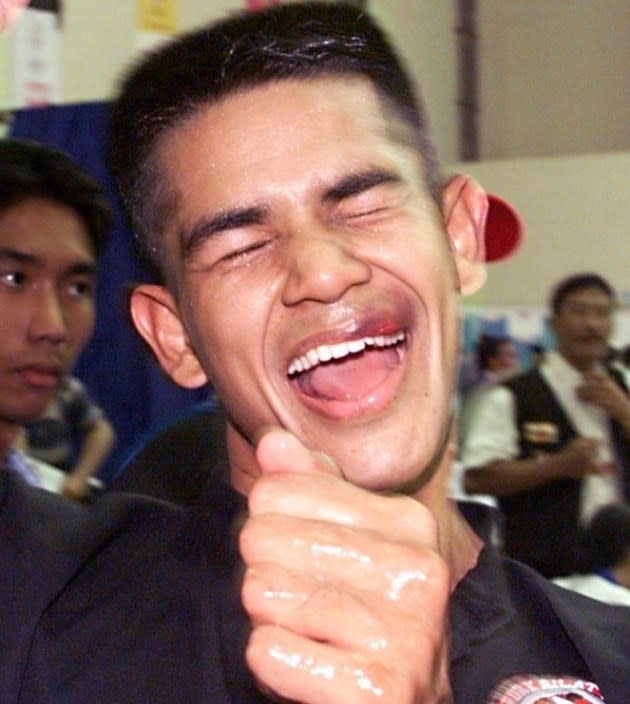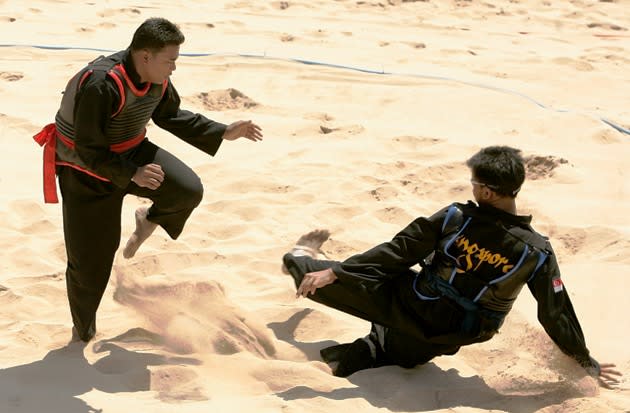Remembering Abdul Kadir: the “smiling” legend of Singapore silat
An exceptional friend; mentor; athlete and martial artist; a person who wore a constant smile in the face of adversity.
Recently-deceased Singapore silat fighter Abdul Kadir Ibrahim was all of the above, and much more, according to the local silat community.
The retired 1997 world champion suffered a sudden heart attack while jogging and passed away last Friday.
He was 41, and leaves behind six children – the youngest only three weeks old and the eldest, a Secondary 3 student.
Kadir, who ran a transport business, also fathered a legacy that still inspires many.
From 1992 to 2005, as an active silat competitor, he was known for his calm, composed and positive demeanour, according to ex-teammate Hidayat Hosni, head coach at the Singapore Silat Federation (PERSISI).
“Even when tired or losing, he always maintained a smile,” said Hidayat, 40.
There were instances where Kadir would grin and press on through injury, added his former training partner Imran Abdul Rahman.
Imran told Yahoo! Singapore that behind the smile was a sportsman of the highest order.
“He put his mind, body and soul to training,” said the owner of Sports Silat Academy. “Kadir’s discipline and commitment was admired by all.”

Teacher
Singapore’s most prominent silat figure, Sheik Alau’ddin, similarly hailed his former teammate’s contribution to the sport.
The chief of PERSISI described Kadir, who later coached the junior national squad from 2006 to 2007, as “well-liked by students and dedicated to his job”.
Those taught by Kadir were more unreserved with their sentiments.
“He was a legend; an inspiration,” said Razif Moklas, 28.
“Kadir was not the typical martial arts instructor, shouting and commanding,” recalled Razif, a former world champion himself. “He was very down-to-earth and the students could relate to him.”
“A lot of athletes were influenced by him and saddened when he retired. After he left, there was a huge void.”
World championship medallist Qassadi Ibrahim can attest to Kadir’s impact as a mentor. The 28-year-old remembers how his senior guided him through a trying period in his competitive career.
“From 2004 to 2007, I kept getting silver at the national championships. I was demoralised and wanted to give up. But he always motivated me and told me that one day I’d win my title,” said Qassadi.
“His advice changed my outlook and helped me win the national championships in 2008.”
With Kadir’s help, Qassadi remained unbeaten and a national champion till 2012.
“He’s one of the best that Singapore ever had,” declared Qassadi.
But even greater than the athlete was the man himself.
Exemplary
“He was genuine, sincere and generous,” said Imran, who co-founded a silat school with Kadir after the latter left the silat scene in 2008.
Imran believes Kadir’s retirement was partly influenced by his mother-in-law’s death from cancer in 2007.
“There was a drastic change in him. He became a lot more pious in the last five years,” described the 30-year-old. “He often said to me, ‘Imran, life is short, even at a young age you can be taken’.”
“I don’t know if it’s a sign or not, but I believe God loves him. He was ready,” said Imran.
Imran revealed that Kadir’s brother-in-law would take over as guardian of his six children, and that the silat community would step in for any assistance the family may require, financial or otherwise.
A lasting memory of his close friend, Imran related, was the many principles he had – and how he lived up to them.
“He had this one: ‘Whatever happens, do not lie. Always speak the truth’,” said Imran.
Simple, yet powerful – much like Abdul Kadir himself, and a mark of a champion in not just the sporting arena, but in life itself.



